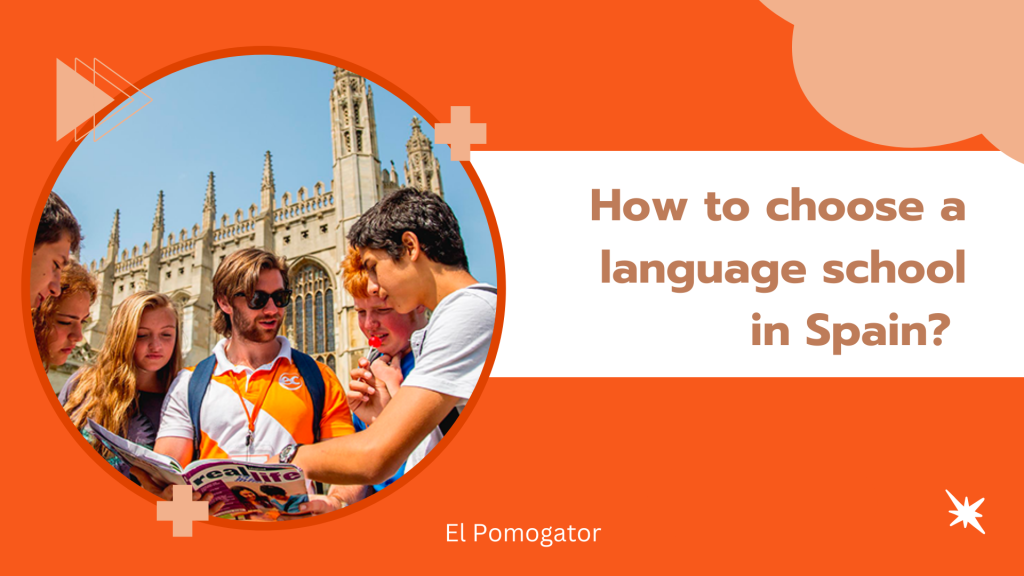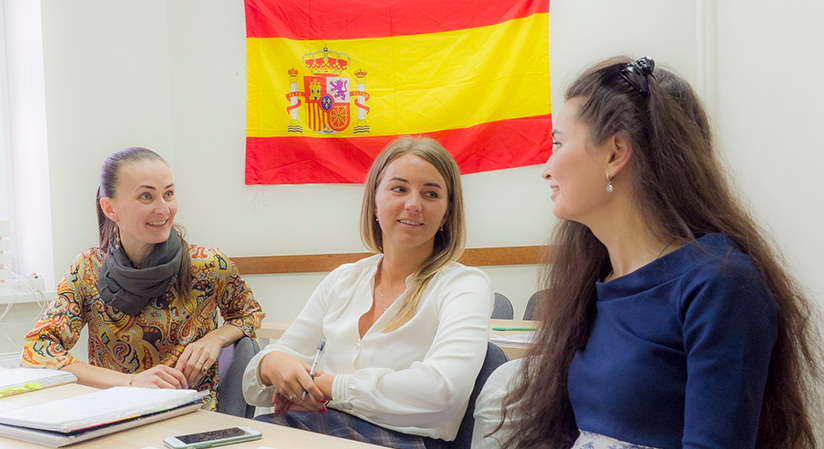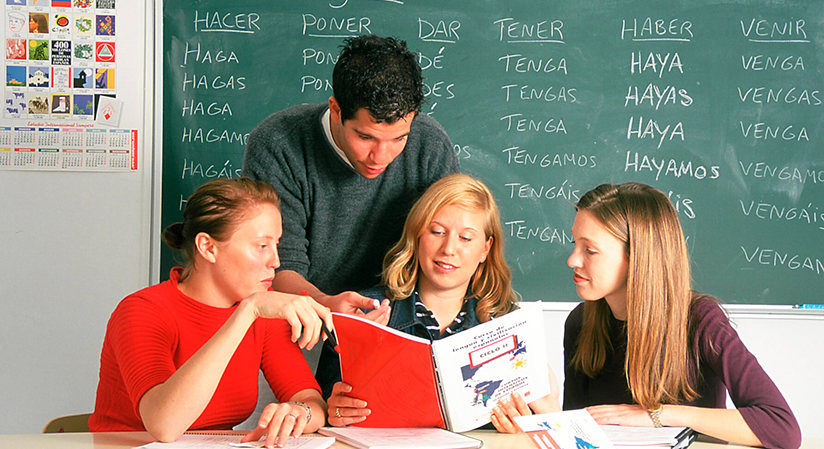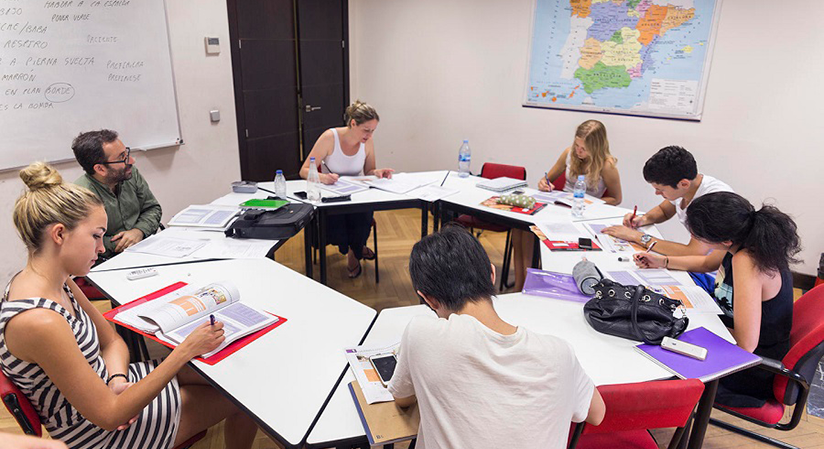Turnkey relocation to Spain from 6 weeks
We will help you to obtain a Spanish residence permit for the whole family with a minimum tax burden!
Read more
Get a free consultation
From 0 €
Tax burden per month
From 6 weeks
Term for obtaining a residence permit
5 years
Until permanent residence permit


How to choose a language school in Spain

Language schools in Spain aren't just for young students fresh out of high school. Even adults planning to emigrate to Spain often choose to study at a language school as a pathway to integrating into the country. Language course attendees in Spain come from various age groups. Let’s break down the specifics of language learning in Spain and how to choose the right school based on age or specific needs.

 The variety of courses available is a significant factor in choosing a school. Beginners are typically recommended to enroll in a General Spanish course, which includes 20 lessons per week and covers grammar, speaking, reading, and listening skills. For students with a basic understanding of Spanish, more advanced courses are available. If you’re starting from scratch, check if the school offers beginner courses.
Some schools also offer specialized programs, such as DELE exam preparation or Spanish for business, economics, accounting, or legal professionals.
Most language schools in Spain also organize excursions, which are a great way to dive deeper into the country’s culture while enhancing your language skills.
The variety of courses available is a significant factor in choosing a school. Beginners are typically recommended to enroll in a General Spanish course, which includes 20 lessons per week and covers grammar, speaking, reading, and listening skills. For students with a basic understanding of Spanish, more advanced courses are available. If you’re starting from scratch, check if the school offers beginner courses.
Some schools also offer specialized programs, such as DELE exam preparation or Spanish for business, economics, accounting, or legal professionals.
Most language schools in Spain also organize excursions, which are a great way to dive deeper into the country’s culture while enhancing your language skills.
 When selecting a language school, consider your goals. If you’re interested in exploring a new country, making friends, and learning Spanish, a school that offers student housing might be ideal. The cost of tuition depends on factors such as course duration, the number of lessons, and the chosen program. Some schools offer discounts for international students.
It’s essential to clarify accommodation options when choosing a school. Some schools provide dormitory-style living, while others offer homestays with local families or assistance in renting a room either independently or with other students.
When selecting a language school, consider your goals. If you’re interested in exploring a new country, making friends, and learning Spanish, a school that offers student housing might be ideal. The cost of tuition depends on factors such as course duration, the number of lessons, and the chosen program. Some schools offer discounts for international students.
It’s essential to clarify accommodation options when choosing a school. Some schools provide dormitory-style living, while others offer homestays with local families or assistance in renting a room either independently or with other students.
 If you’re choosing a language school for a child, there’s a significant advantage in the form of trips to international camps. These opportunities are available for children aged 5 to 18, usually from June to August. These camps allow children to enjoy the seaside while practicing Spanish in a relaxed, friendly environment.
If you’re choosing a language school for a child, there’s a significant advantage in the form of trips to international camps. These opportunities are available for children aged 5 to 18, usually from June to August. These camps allow children to enjoy the seaside while practicing Spanish in a relaxed, friendly environment.
 When applying, ensure the school meets state standards. If a school lacks the necessary accreditation, you may not be able to obtain a visa based on its invitation. Be cautious with Work and Study programs, as student visas in Spain generally do not allow for paid work, although unpaid internships and volunteer work are permitted. Clarify this with the school administration during the application process.
If your visa application is denied, most schools will refund your tuition fee. However, it’s important to read the contract carefully, particularly the terms regarding refunds or financial retention in the case of force majeure or voluntary withdrawal.
While finding the right language school in Spain can be challenging, we hope these tips help you make an informed decision. EL Relocator can handle all the complexities of obtaining a student visa, allowing you to focus on enjoying your language studies in sunny Spain.
When applying, ensure the school meets state standards. If a school lacks the necessary accreditation, you may not be able to obtain a visa based on its invitation. Be cautious with Work and Study programs, as student visas in Spain generally do not allow for paid work, although unpaid internships and volunteer work are permitted. Clarify this with the school administration during the application process.
If your visa application is denied, most schools will refund your tuition fee. However, it’s important to read the contract carefully, particularly the terms regarding refunds or financial retention in the case of force majeure or voluntary withdrawal.
While finding the right language school in Spain can be challenging, we hope these tips help you make an informed decision. EL Relocator can handle all the complexities of obtaining a student visa, allowing you to focus on enjoying your language studies in sunny Spain.
Go back to the blog
Types of Language Schools in Spain
When choosing a language school, it’s essential to consider the type of institution:- Private Schools: These offer the most prestigious education but at a higher cost. Private language schools in Spain are few, and competition for entry is tough. The prestige of these schools comes not from their name but from their high educational standards. Licensed private language schools are known for their strict approach to the learning process, with a fixed curriculum and rigorous assessment standards. These schools focus on the comprehensive development of students, which makes them highly sought after.
- Public Schools: In public language schools, the duration of courses and the academic calendar are strictly fixed, unlike in private institutions where students can choose the length of their studies. The structured approach of public schools is ideal for those who prefer a more traditional academic environment.
- Online Schools: The main advantage of online schools is the ability to study remotely. However, not all online schools are licensed, making it challenging to select a reputable one. Additionally, obtaining a student visa for online courses is generally not possible.

Criteria for Choosing a Language School
When selecting a language school, it’s important to verify its accreditation, especially from the Instituto Cervantes. The school’s longevity in the education sector is also crucial. Schools that regularly feature in rankings usually offer high-quality language programs and maintain a strong reputation. Be cautious of schools without accreditation, as they might have limited experience and could close unexpectedly, posing a risk to students aiming for a recognized diploma. Schools located in cities like Barcelona, Alicante, Valencia, or Madrid provide a unique opportunity to immerse yourself in the local culture of these vibrant tourist destinations, enhancing your language learning experience. Consider the school’s facilities, equipment, and additional services. Some schools offer accommodation, such as modern dormitories or homestays with Spanish-speaking families, which can greatly enhance the learning experience. Some schools are even housed in historically significant buildings, adding an extra layer of cultural immersion. The variety of courses available is a significant factor in choosing a school. Beginners are typically recommended to enroll in a General Spanish course, which includes 20 lessons per week and covers grammar, speaking, reading, and listening skills. For students with a basic understanding of Spanish, more advanced courses are available. If you’re starting from scratch, check if the school offers beginner courses.
Some schools also offer specialized programs, such as DELE exam preparation or Spanish for business, economics, accounting, or legal professionals.
Most language schools in Spain also organize excursions, which are a great way to dive deeper into the country’s culture while enhancing your language skills.
The variety of courses available is a significant factor in choosing a school. Beginners are typically recommended to enroll in a General Spanish course, which includes 20 lessons per week and covers grammar, speaking, reading, and listening skills. For students with a basic understanding of Spanish, more advanced courses are available. If you’re starting from scratch, check if the school offers beginner courses.
Some schools also offer specialized programs, such as DELE exam preparation or Spanish for business, economics, accounting, or legal professionals.
Most language schools in Spain also organize excursions, which are a great way to dive deeper into the country’s culture while enhancing your language skills.
 When selecting a language school, consider your goals. If you’re interested in exploring a new country, making friends, and learning Spanish, a school that offers student housing might be ideal. The cost of tuition depends on factors such as course duration, the number of lessons, and the chosen program. Some schools offer discounts for international students.
It’s essential to clarify accommodation options when choosing a school. Some schools provide dormitory-style living, while others offer homestays with local families or assistance in renting a room either independently or with other students.
When selecting a language school, consider your goals. If you’re interested in exploring a new country, making friends, and learning Spanish, a school that offers student housing might be ideal. The cost of tuition depends on factors such as course duration, the number of lessons, and the chosen program. Some schools offer discounts for international students.
It’s essential to clarify accommodation options when choosing a school. Some schools provide dormitory-style living, while others offer homestays with local families or assistance in renting a room either independently or with other students.
Additional Services and opportunities
Spanish language schools strive to offer a wide range of services to accommodate different preferences. For students looking for full cultural immersion, schools that offer homestays with local families are highly recommended. This option allows for a deeper cultural experience, whether it’s with a host family or in a dormitory with partial board. For students seeking more independence, private apartments or studios may be more suitable. If you’re choosing a language school for a child, there’s a significant advantage in the form of trips to international camps. These opportunities are available for children aged 5 to 18, usually from June to August. These camps allow children to enjoy the seaside while practicing Spanish in a relaxed, friendly environment.
If you’re choosing a language school for a child, there’s a significant advantage in the form of trips to international camps. These opportunities are available for children aged 5 to 18, usually from June to August. These camps allow children to enjoy the seaside while practicing Spanish in a relaxed, friendly environment.
How to apply and prepare for study
The application process for language schools in Spain is straightforward. Students typically need to pay a registration fee, and in some cases, the full course fee may be required upfront, although a partial deposit is more common. Once the payment is made, the school sends an invitation, which can be used to apply for a Spanish visa. One of the advantages of private schools over public ones is the flexibility to start courses at any time of the year. Regardless of your Spanish level, you can take a placement test to determine your language group. If you already have some knowledge of Spanish, you can begin classes any Monday. For beginners, separate schedules are usually arranged. When applying, ensure the school meets state standards. If a school lacks the necessary accreditation, you may not be able to obtain a visa based on its invitation. Be cautious with Work and Study programs, as student visas in Spain generally do not allow for paid work, although unpaid internships and volunteer work are permitted. Clarify this with the school administration during the application process.
If your visa application is denied, most schools will refund your tuition fee. However, it’s important to read the contract carefully, particularly the terms regarding refunds or financial retention in the case of force majeure or voluntary withdrawal.
While finding the right language school in Spain can be challenging, we hope these tips help you make an informed decision. EL Relocator can handle all the complexities of obtaining a student visa, allowing you to focus on enjoying your language studies in sunny Spain.
When applying, ensure the school meets state standards. If a school lacks the necessary accreditation, you may not be able to obtain a visa based on its invitation. Be cautious with Work and Study programs, as student visas in Spain generally do not allow for paid work, although unpaid internships and volunteer work are permitted. Clarify this with the school administration during the application process.
If your visa application is denied, most schools will refund your tuition fee. However, it’s important to read the contract carefully, particularly the terms regarding refunds or financial retention in the case of force majeure or voluntary withdrawal.
While finding the right language school in Spain can be challenging, we hope these tips help you make an informed decision. EL Relocator can handle all the complexities of obtaining a student visa, allowing you to focus on enjoying your language studies in sunny Spain.

 27/09/2024
27/09/2024  Reading time: 8 min
Reading time: 8 min 





